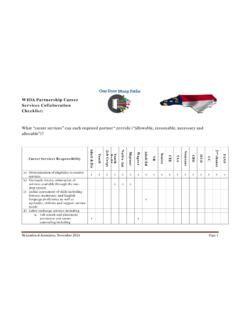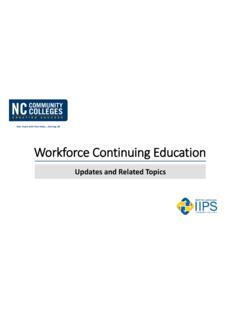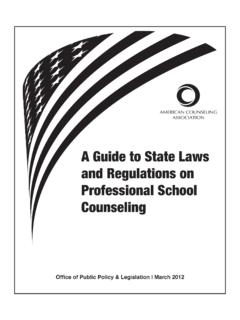Transcription of Medication Administration 5-Hour Training Course for Adult ...
1 Medication Administration 5-Hour Training Course for Adult Care Homes Instructor Manual North Carolina Department of Health and Human Services Division of Health Service Regulation Center for Aide Regulation and Education Adult Care Licensure Section Medication Administration 5-Hour Training Course for Adult Care Homes i The Medication Administration : 5-Hour Training Course for Adult Care Homes was developed as a joint effort by the Center for Nurse Aide Education and Regulation and Adult Care Licensure Section of the Division of Health Service Regulation, Department of Health and Human Services. The curriculum for the 5-Hour Training Course was adapted from the Medication Administration : A Medication Aide Training Course developed by the North Carolina Department of Health and Human Services and the North Carolina Board of Nursing.
2 CURRICULUM DEVELOPMENT Center of Aide Education and Regulation, Division of Health Service Regulation Adult Care Licensure Section, Division of Health Service Regulation North Carolina Department of Health and Human Services September 2013 Medication Administration : Instructor Manual 5-Hour Training Course for Adult Care Homes Table of Contents ii TABLE OF CONTENTS Section Title Page Title Page i Table of Contents ii Medication Aide in Adult Care Homes v Introduction vi Pre-requisite for Students vi Medication Aide Course Training Requirements and Directions for Use vii Student Manual viii Course Objectives ix Course Schedule xi Prerequisite Skills Review and Validation 1 Section 1 Basic Medication Administration Information/Terminology 1-1 Teaching Guide 1-2 Abbreviations 1-3 Common Routes of Medication Administration 1-4 Common Dosages Forms of Medications 1-4 Intro to Equipment and Supplies for Medication Administration 1-5 Six
3 Rights of Medication Administration 1-6 Medication Errors 1-7 Medication Administration and Resident s Rights 1-7 Medication Allergy 1-8 Recognizing Side Effects 1-8 Medication Resources or References 1-9 Section 2 Medication Orders 2-1 Teaching Guide 2-2 Medication Orders 2-3 Definition of an Order 2-3 Components of an Order 2-3 Telephone and Verbal Orders 2-4 Forms commonly used to Document Medication Orders 2-5 FL-2 2-5 Physician s Order Forms 2-5 Medication Administration Records (MARs) 2-5 Medication Labels 2-6 Medication Administration : Instructor Manual 5-Hour Training Course for Adult Care Homes Table of Contents iii Section Title Page Section 3 Medication Administration 3-1 Teaching Guide 3-2 Infection Control/Standard Precautions 3-3 Hand Hygiene 3-4 Gloves 3-5 Injection Safety 3-6 Medication Administration Supplies 3-6 Right Resident: Identifying Residents 3-7 Right Medication /Right Dose/Right route /Right Time: Medication Administration Record and Medication Label 3-7 Right Documentation.
4 Medication Administration Record 3-8 Unique Situations to do Prior to Administration of Medications 3-9 Vital Signs 3-9 Crushing Medications 3-10 Administering Medications: Medication Routes General Medication Administration 3-10 Oral Medication Administration 3-11 Sublingual Medication Administration 3-12 Oral Inhalant 3-13 Eye Medication Administration 3-13 Ear Medication Administration 3-13 Nasal Medication Administration 3-14 Transdermal Medication Administration 3-14 Topical Medication Administration 3-15 Injection Medication Administration (Optional) 3-15 Section 4 Ordering, Storage and Disposal of Medications Teaching Guide 4-2 Ordering Medication 4-3 Medication Storage 4-3 Controlled Substances 4-4 Disposal of Medications 4-4 Section 5 Medication Administration Checklists Instructions for Completing the Medication Administration Checklists 5-1 Hand Hygiene (Skills #1-3) 5-3 General Medication Administration (Skills #4A & #4B) 5-6 Medication Administration .
5 Instructor Manual 5-Hour Training Course for Adult Care Homes Table of Contents iv Section Title Page Section 5 Medication Administration (cont d) Oral Medication Administration (Skill #5) 5-8 Sublingual Medication Administration (Skill #6)) 5-9 Oral Inhalant (Skill #7) 5-10 Eye Medication Administration (Skill #8) 5-11 Ear Medication Administration (Skill #9) 5-13 Nasal Medication Administration (Skill #10) 5-14 Transdermal Medication Administration (Skill #11) 5-15 Topical Medication Administration (Skill #12) 5-16 Injections Medication Administration (Skill #13 & #14) 5-17 Section 6 Handouts #1A Abbreviations 6-1 #1B Common Routes of Medication Administration 6-2 #1C Common Dosage Forms of Medications 6-3 #1D Six Rights of Medication Administration 6-4 #1E Medication Errors 6-5 #1F Resident s Refusal to Take Medications 6-6 #2A Medication Orders 6-7 #2AA Medication Order (Answers) 6-8 #2B FL-2 (Blank) 6-9 #2C MAR (Blank) 6-10 #2D FL-2 (Transcription Activity) 6-11 #2E MAR (Transcription Activity Answers) 6-12 #2F Medication Labels 6-13 #3A Injection Safety.
6 Diabetes & Viral Hepatitis 6-14 #3B Review of Measuring Devices 6-15 #3C Always and Never 6-16 #3D Measuring Tips 6-17 #3E Technique and Use of Oral Inhalers 6-18 Section 7 Activities Activity #1 Hand Hygiene 7-2 Activity #2 Instructions for Glove Sizing 7-3 Activity #3 Gloves, Gloves, Gloves 7-4 Activity #4A, B, C Medication Administration Record 7-5 Appendix Test 7-8 Certificate 7-14 References 7-15 Medication Administration 5-Hour Training Course for Adult Care Homes v Medication Aide in Adult Care Homes 1. A Medication Aide in Adult care homes is an individual who has successfully completed the required Medication Aide Course (s) approved by the Department of Health and Human Services, passed the state written Medication exam for unlicensed staff in Adult care homes and has competency skills validation at the employing facility.
7 Any individual employed as a Medication Aide prior to 10/01/2013 must be able to verify employment as a Medication aide within the previous 24 months and completed competency skills validation and passed the state written exam for Medication Aides in Adult care homes. All Medication Aides in Adult care homes must have competency validation at the employing facility and maintain the 6 hours of continuing education requirements annually. 2. The laws and regulations governing Medication Aides in Adult care homes in include: GS , GS , GS , 10A NCAC 13F/G .0403; 10A NCAC 13F/G .0503; 10A NCAC 13F/G .0505; 10A NCAC 13F/G .0506, 10A NCAC 13F/G .0903 and 10A NCAC 13F/G .1000. 3. The routes of Medication Administration in this Course include the following: oral, eye, ear, nasal, inhalant, transdermal and topical.
8 General information and skills check off for subcutaneous injections, is included in the curriculum but is only required if the task will be performed by Medication Aide. 4. Allegations of fraud against a facility or resident, resident abuse or neglect, misappropriation of property belonging to a resident or facility, or diversion of Medication belonging to a resident or facility by the Medication Aide must be reported to the Health Care Personnel Registry. Substantiated findings by the Heath Care Personnel Registry are posted on the Health Care Personnel Registry. 5. It is the responsibility of the Medication Aide to notify the Adult Care Licensure Section of name and address changes. 6. Information on registration for the state written exam for unlicensed staff in Adult care homes may be obtained at or via email to Results or verification may be obtained via website at Adult Care Medication Testing.
9 Medication Administration 5-Hour Training Course for Adult Care Homes vi INTRODUCTION In 2011, the North Carolina Legislature mandated Training in addition to competency evaluation requirements for Adult care home Medication aides. As a response to the legislation, the North Carolina Department of Health and Human Services, Division of Health Service Regulation, has developed the required 5-Hour and 10-hour Training courses that include instruction in the key principles of Medication Administration and infection prevention. The department developed a 5-Hour , 10-hour and 15-hour standardized Training Course to assist qualified instructors to train unlicensed staff who will administer medications to residents in Adult Care Homes.
10 Each Training Course includes an instructor manual, materials for a student manual and a certificate template required for participants who successfully complete the Course (s). Course Description The 5-Hour Training Course was built around the current skills checklist required for Medication staff in Adult care homes. The majority of the 5-Hour Course schedule centers around time spent for instruction and validation of skills required for Medication Administration . Individuals are expected to pass the clinical skills tasks with 100% competency demonstrated. The design of the Course was for a small class of employees or 1:1 Training for a specific facility. The 10-hour Training Course builds upon content in the initial 5-Hour Training Course and developed as a refresher for the employee.







